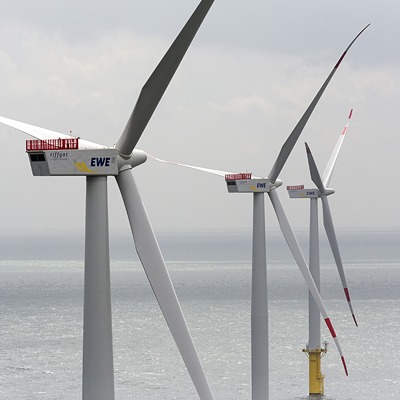
A 20 percent contribution from wind power can be accommodated using existing balancing mechanisms says the report Wind energy: implications of large-scale deployment on the GB electricity system. However, any further expansion will render the task of managing the system increasingly difficult.
The RAE produced its report in order to assess the potential for wind energy to contribute to the government’s target of providing 15 percent of the UK’s energy from renewable sources by 2020 and cutting 80 percent of greenhouse gas emissions by 2050.
“Wind energy has emerged as the first variable renewable generating technology to be deployed at scale on our electricity system” said John Trewby CB FREng, chair of the RAE's working group on wind energy. “It elicits strong feelings and the debate has become very polarised. We felt that the Academy could make a useful contribution by setting out the engineering characteristics of the technology and exploring the implications of increasing the amount of wind energy on the electricity system.”
Mr Trewby added that the issues raised by wind energy are many, novel and complex and therefore deserve debate. The RAE has therefore attempted to provide a helpful and balanced assessment of the challenges faced by engineers as the UK seeks to develop an energy system for the future.
The major issue is how to manage fluctuations in supply, including from variable renewable sources such as wind power. If the UK is to meet its targets the grid will have to be decarbonised by 2030 with current, fossil fuel-intensive, systems such as transport and heating largely dominated by electrified systems such as heat pumps and electric vehicles (EVs). In turn this will increase demand for electricity as well as increasing fluctuations in demand, both daily and seasonally.
Another member of the working group, Professor Roger Kemp FREng from Lancaster University, said that wind is seen as playing a major role in the future but that the task of decarbonisation represents a paradigm shift in the UK energy system. The scale of the challenge should not be underestimated.
“Wind energy will be only one of the tools available alongside other generating technologies, better connectivity and demand side measures” Professor Kemp added. “All will need to be carefully integrated using a systems engineering approach. As we progress towards a low-carbon future, the energy industry and infrastructure will have to evolve ahead of or with electricity demand to accommodate more wind. This evolution is complex and will also require other forms of low carbon generation, innovations in energy storage, management and more interconnections with the electricity grids in other countries.”
Professor Kemp went on to warn that this will only happen if there is clarity in the government’s plan for future decarbonisation alongside a willingness to work with industry in building confidence for investors. At present, several countries are ahead of the UK in developing wind energy and the country will need to adopt best practice wherever that might be.
The report recommends quick implementation of the Electricity Market Reform and clarity on overall costs and benefits. It also stresses the need for a long-term and clear trajectory in government plans for decarbonisation, a true partnership between government and industry and more engagement with the public with regard to impacts and benefits.
For additional information:

